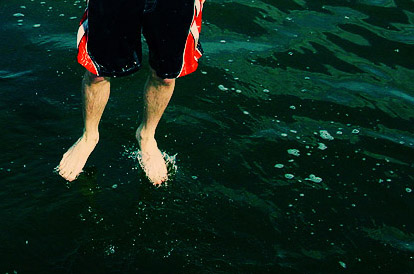Debbie Urbanski
That’s why Virginia went with this particular circus, where the fire swallower, on a bad day, when the crows made too loud of a racket, could miss his mouth, the flames leaving the left side of his face blistered. It was a real fire he was dealing with, the dwarfs were really small, the strong men actually strong, and likewise Virtuous Virginia, the Girl Who Hated Sex, did in fact hate sex. She had tried it for years, boyfriends, girlfriends, a husband, then grew tired the acting required, her husband’s insistence that they look into each other’s eyes. She always closed her eyes. The intense loneliness of someone’s body, she had no need for it. She felt smothered during it. “There are these pills, you know,” the husband had suggested. He made her get the pills from her doctor. She opened up the bottle and flushed the pills down the toilet. “Are you some kind of freak?” he had asked, finding the empty bottle in the garbage.
The circus turned out to be nice. They gave her a nylon camping tent, a down sleeping bag, and all the bags of salty popcorn she could ever eat. No one snickered or suggested any special exercises. There was no pointing at her. There was a llama, and two wolves with bright blue eyes, and a pair of clowns who rode unicycles, and a woman who executed climbing tricks on a rope that seemed to balance in mid-air. Everything was going fine until, in her second month, when they arrived in Northern Minnesota, she had a vision.
A man in silver robes put a crown on her head, a gold and heavy crown that made her eyes ache. And the sun reflected off the crown and put a halo of light around her hair, and the man nodded and scratched through his beard at his chin. He asked her to dance and they danced in this quiet white room where the blinds where wide open to show all the blackness outside, a swirling blackness, as if it was snowing blackness. When they danced, only the tips of their fingers touched. It felt Victorian. The music came from the corner, where a small, sad harpist sat wrapped around her harp, plucking each string, one by one, slowly, as if they had all the time ever created. And small flying things she could never see clearly came with roses in their beaks and dropped the roses above their heads until there was a raining down of disembodied flower petals. When she woke, it was dawn and there in her tent were four rose bushes seizing out of the nylon floor, and at the ends of her fingers were roses emerging from the soft pink flesh under her nails. Her skin glowed brightly, and her eyes shown as if she saw stars everywhere, and when she walked out of her tent onto the damp ground, the rain missed her and fell beside her in long flowing puddles. She stepped barefoot over the puddles, and the skin of her feet did not grow wet, the rosy skin of her feet, flushed as if she had finally fallen into love. That’s what all the others thought, lazily emerging from their own tents toward the steam from the oatmeal pot. They pointed and muttered among themselves, wondering who gave that girl the flowers that were dripping off of her and floating now, like little flaming candles, in all the puddles that had gathered up in the gravel parking lot.
“Not in your contract,” the circus owner said. On his desk, laid out in triplicate, were copies of the contract she had signed months ago. “You’re freaking out the other girls. Not one woman has fainted in the audience since you started –“ he waved his hands around in the air as if he was about to conjure something – “whatever you want to call it. Your little freak show in the air. The audience is supposed to be fainting. Oh my God look at that, the girl who doesn’t like sex! Oh my, oh my! Then faint. That’s the point.”
The vision changed other things too.
Virginia would go to sleep but not really sleep. She would feel some part of her leave the tent and go wandering for miles in the dark, the moon forced behind the clouds, until that part of her reached the town, and the houses where the people lay in their beds. There some part of Virginia would slip in through the cracks of their doors, or through a window left ajar, the air around her stinking of lilacs, and often a bird, or two birds, or a yellow monarch, would flutter in the space where she was, to watch over the people in their private sleep. She was able to see their dreams: the shame of them, or their strange longings, though not for what they had either. One woman imagined herself as a pile of orange leaves, each leaf being lifted up by the wind and carried away blindly. That particular woman had cried in her sleep because obviously this wasn’t going to happen to her. Virginia had reached out her hand and placed it across the woman’s eyes, as she did when anyone’s dreams became too sad. It was unclear whether she was doing any good but it felt like a possibility.
Debbie Urbanski is a writer living in Syracuse, New York. Her work focuses on aliens, marriage, cults, belief, and family, or some combination of those themes. You can find her online at debbieurbanski.com.

